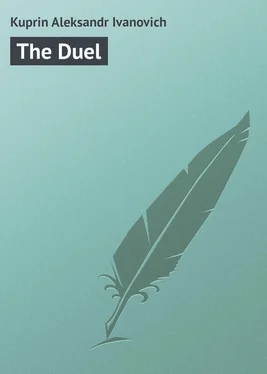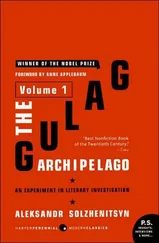Aleksandr Kuprin - The Duel
Здесь есть возможность читать онлайн «Aleksandr Kuprin - The Duel» — ознакомительный отрывок электронной книги совершенно бесплатно, а после прочтения отрывка купить полную версию. В некоторых случаях можно слушать аудио, скачать через торрент в формате fb2 и присутствует краткое содержание. Жанр: Русская классическая проза, на английском языке. Описание произведения, (предисловие) а так же отзывы посетителей доступны на портале библиотеки ЛибКат.
- Название:The Duel
- Автор:
- Жанр:
- Год:неизвестен
- ISBN:нет данных
- Рейтинг книги:5 / 5. Голосов: 1
-
Избранное:Добавить в избранное
- Отзывы:
-
Ваша оценка:
- 100
- 1
- 2
- 3
- 4
- 5
The Duel: краткое содержание, описание и аннотация
Предлагаем к чтению аннотацию, описание, краткое содержание или предисловие (зависит от того, что написал сам автор книги «The Duel»). Если вы не нашли необходимую информацию о книге — напишите в комментариях, мы постараемся отыскать её.
The Duel — читать онлайн ознакомительный отрывок
Ниже представлен текст книги, разбитый по страницам. Система сохранения места последней прочитанной страницы, позволяет с удобством читать онлайн бесплатно книгу «The Duel», без необходимости каждый раз заново искать на чём Вы остановились. Поставьте закладку, и сможете в любой момент перейти на страницу, на которой закончили чтение.
Интервал:
Закладка:
“Two or three little Jewess girls were there, but what is that to do with me? I took no notice of them.”
“Ah! we know well enough how you play the game with ladies,” said Viätkin jestingly.
“I say!” interrupted Lbov, with a laugh; “have you heard what General Dokturov 2 2 One of Russia’s bravest and greatest generals in the war with Napoleon, 1812.
remarked about the Adjutants in the infantry? It ought to interest you, Biek. He said they were the most dare-devil riders in the whole world.”
“No lies, now, ensign,” replied Biek, as he gave his horse the reins and assumed an expression as if he intended to ride down the joker.
“It’s true, by God it is! ‘They ride,’ said he, ‘the most wretched “crocks” in the world – spavined “roarers” – and yet, only give the order, and off they fly at the maddest speed over stocks and stones, hedges and ditches – reins loose, stirrups dropped, cap flying, ah! – veritable cantaurs.’”
“What news, Biek?” asked Viätkin.
“What news? None. Ah! stay. A little while ago the Commander of the regiment ran across Lieutenant-Colonel Liekh at mess. Liekh, as drunk as a lord, was wobbling against the wall with his hands behind him, and hardly able to stammer out a syllable. Shulgovich rushed at him like an infuriated bull, and bellowed in such a way that it might be heard over the whole market-place: ‘Please remove your hands from the small of your back when you stand in the presence of your commanding officer.’ And all the servants witnessed this edifying scene.”
“Ah! that is detestable,” chimed in Viätkin, laughing. “Yesterday, when he favoured the 4th Company with a visit, he shouted: ‘Who dares to thrust the regulations in my face? I am your regulations. Not a word more. Here I’m your Tsar and your God.’”
Lbov was again laughing at his own thoughts.
“Gentlemen, have you heard what happened to the Adjutant of the 4th Regiment?”
“Keep your eternal stories to yourself, Lbov,” exclaimed Viätkin, interrupting him in a severe tone. “To-day you’re worse than usual.”
“I have some more news to tell,” Biek-Agamalov went on to say, as he again facetiously threatened Lbov with his horse, which, snorting and shaking its head, beslavered all around it with foam. “The Commander has taken it into his head that the officers of all the companies are to practise sabre-cutting at a dummy. He has aroused a fearful animosity against himself in the 9th Company. Epifanov was arrested for having neglected to sharpen his sabre. But what are you frightened of, Lbov? He isn’t dangerous, and you must teach yourself to make friends with these noble animals. It may, you know, some day fall to your lot to be Adjutant; but then, I suppose, you will sit your horse as securely as a roast sparrow on a dish.”
“ Retro, Satanas! ” cried Lbov, who had some difficulty in protecting himself against the horse’s froth-covered muzzle. “You’ve heard, I suppose, what happened to an Adjutant of the 4th Regiment who bought himself a circus-horse? At the review itself, right before the eyes of the inspecting General, the well-trained beast began to exhibit its proficiency in the ‘Spanish walk.’ You know, I suppose, what that is? At every step the horse’s legs are swung high in the air from one side to the other. At last, both horse and rider alighted in the thick of the company. Shrieks, oaths, universal confusion, and a General, half-dead with rage, who at last, by a supreme effort, managed to hiss out: ‘Lieutenant and Adjutant, for this exhibition of your skill in riding you have twenty-one days’ arrest. March!’”
“What rot!” interrupted Viätkin in an indignant tone. “I say, Biek, the news of the sabre-cutting was by no means a surprise to us. It means that we do not get any free time at all. Turn round and see what an abortion some one brought here yesterday.”
He concluded his sentence by a significant gesture towards the middle of the parade-ground, where a monstrously ugly figure of raw clay, lacking both arms and legs, had been erected.
“Ha! look there – already. Well, have you tried it?” asked Biek, his interest excited. “Have you had a go at it yet, Romashov?”
“Not yet.”
“Don’t you think I’ve something better to do than occupy myself with rubbish of that sort?” exclaimed Viätkin angrily. “When am I to find time for that? From nine in the morning to six at night I have to be here, there, and everywhere, and hardly manage to get a bite or sup. Besides, thank God! I’ve still my wits about me.”
“What silly talk! An officer ought to be able to handle his sabre.”
“Why? if I may ask. You surely know that in warfare, with the firearms now in use, one never gets within a range of a hundred paces of the enemy. What the devil’s the use of a sabre to me? I’m not a cavalryman. When it comes to the point, I shall seize hold of a rifle and – bang! So the matter’s simple enough. People may say what they please; the bullet is, after all, the safest.”
“Possibly so; but, even in time of peace, there are still many occasions when the sabre may come in useful – for instance, if one is attacked in street riots, tumults, etc.”
“And you think I should condescend to exchange cuts with the tag-rag of the streets? No, thank you, my good friend. In such a case I prefer to give the command, ‘Aim, fire’ – and all’s said and done.”
Biek-Agamalov’s face darkened.
“You are talking nonsense, Pavel Pavlich. Now answer me this: Suppose, when you are taking a walk, or are at a theatre or restaurant, some coxcomb insults you or a civilian boxes your ears. What will you do then?”
Viätkin shrugged his shoulders and protruded his under lip contemptuously.
“In the first place, that kind of man only attacks those who show that they are afraid of him, and, in the second, I have my – revolver.”
“But suppose the revolver were left at home?” remarked Lbov.
“Then, naturally, I should have to go home and fetch it. What stupid questions! You seem to have clean forgotten the incident of a certain cornet who was insulted at a music-hall by two civilians. He drove home for his revolver, returned to the music-hall, and cheerfully shot down the pair who had insulted him – simple enough.”
Biek-Agamalov made an indignant gesture. “We know – we have heard all that, but in telling the story you forget that the cornet in question was convicted of deliberate murder. Truly a very pretty business. If I had found myself in a similar situation, I should have – ”
He did not finish his sentence, but the little, well-formed hand in which he held the reins was clenched so hard that it trembled. Lbov was seized with one of his usual paroxysms of laughter.
“Ah! you’re at it again,” Viätkin remarked severely.
“Pardon me, gentlemen, but I really couldn’t – ha, ha, ha! I happened to think of a tragi-comic scene that was enacted in the 17th Regiment. Sub-Ensign Krause on one occasion had a row with some one in an aristocratic club. The steward, to prevent further mischief, seized him so violently by the shoulder-knot that the latter was torn off, whereupon Krause drew his revolver and put a bullet through the steward’s skull. A little lawyer who incautiously mixed himself up in the game shared the same fate. The rest of the party rushed out of the room like so many frightened hens. But Krause quietly proceeded to the camp, and was then challenged by the sentry. ‘Who goes there?’ shouted the sentry. ‘Sub-Ensign Krause, who is coming to die by the colours of his regiment’; whereupon he walked straight up to the colours, laid himself down on the ground, and fired a bullet through his left arm. The court afterwards acquitted him.”
Читать дальшеИнтервал:
Закладка:
Похожие книги на «The Duel»
Представляем Вашему вниманию похожие книги на «The Duel» списком для выбора. Мы отобрали схожую по названию и смыслу литературу в надежде предоставить читателям больше вариантов отыскать новые, интересные, ещё непрочитанные произведения.
Обсуждение, отзывы о книге «The Duel» и просто собственные мнения читателей. Оставьте ваши комментарии, напишите, что Вы думаете о произведении, его смысле или главных героях. Укажите что конкретно понравилось, а что нет, и почему Вы так считаете.












